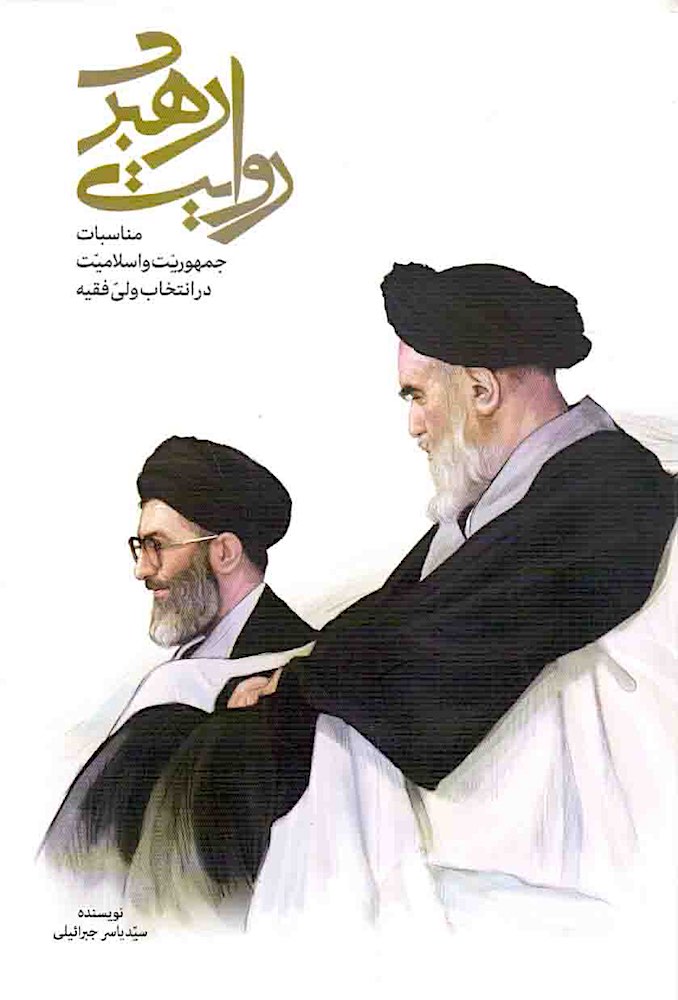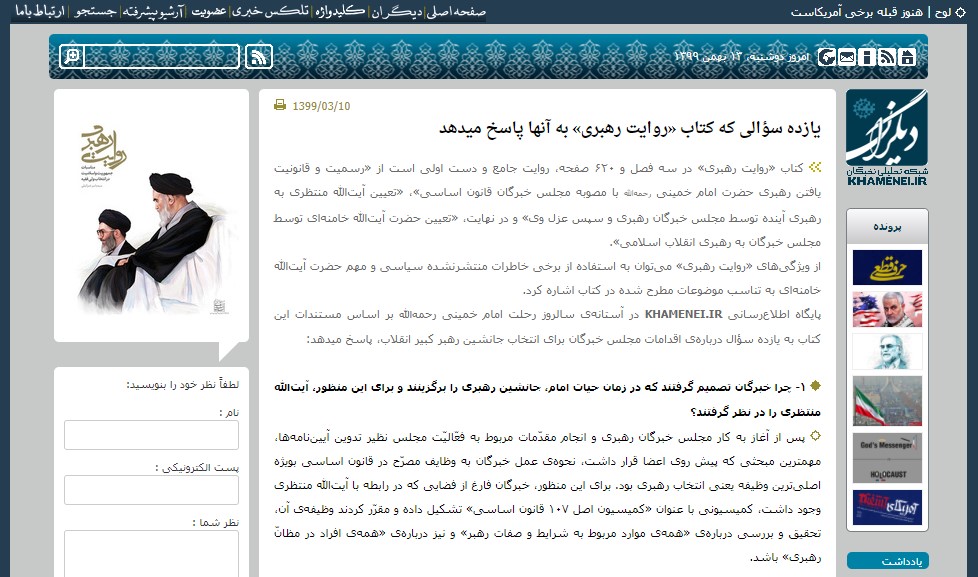Iran’s Supreme Leader Ayatollah Ali Khamenei has published a book in which he defends the order given by his predecessor Ayatollah Ruhollah Khomeini leading to the 1988 massacre of political prisoners in Iran.
Khamenei’s remarks are included in a book called the ‘Leader’s Narrative’ (“Revayate Rahbari”), published in July 2019 by the Institute for Preserving and Publishing works by Ayatollah Seyyed Ali Khamenei.
The text of the passage concerning the 1988 massacre is published in Farsi on Khamenei’s official website KHAMENEI.ir. Khamenei’s website further states that the book, which is 620 pages, includes important and exclusive memoirs of Ayatollah Khamenei that have been published for the first time.
Khamenei defends Khomeini’s fatwa ordering the 1988 massacre
Asked his opinion about Khomeini’s fatwa in 1988 ordering the execution of members of the opposition People’s Mojahedin Organisation of Iran (PMOI or MEK) who remained ‘committed’ to the group, Khamenei defends the order. He claims the group in its entirety was ‘waging war on God;’ thus, the execution of its unarmed members who were serving prison sentences at the time was permissible.
In the book, Khamenei states:
“The Imam [Khomeini] was a very pious person. He was not the sort of person who would not care about Islamic limits or be careless because of an issue. He was really very obedient in all matters, let alone in the issue of blood. Well, he had acted and thought in a calculated manner. We were sure of that. Even now, I am sure that the Imam had calculated his plan correctly. That is to say, when a group is at war with the Islamic system and Islamic government and they are Mohareb [waging war on God], it is not only the people who now have a sword in their hands who are Mohareb, but also the one who, for example, has gone to hand over his post and return, he too is one of them. He who is instructing them, he who is plotting, he too is [one of them]. Their reserve soldier is one of them. It makes no difference. The issue of Moharebeh applying to the people with whom they cooperate and are connected is an almost settled issue. The Imam had acted with these considerations. Therefore, from the point of view of jurisprudence, and from the point of view of the Imam’s decision and the Imam’s actions and the Imam’s viewpoint, there is no room for concern.”
Source: https://farsi.khamenei.ir/others-note?id=45800

Passage related to Khamenei’s defence of the 1988 massacre (in Farsi):
آیتالله خامنهای دربارهی حکم حضرت امام(قدّسسرّه) مبنی بر اعدام منافقین سر موضع میگویند: «امام آدم بسیار با ورعی بود. آدمی که به خاطر یک مسأله، اهمّیّت به حدود ندهد و سهلانگاری کند اصلاً نبود، هیچ. ایشان واقعاً در همهی مسائل خیلی آدم متورّعی بود، چه برسد به مسألهی خون. خب ایشان با محاسبه عمل و فکر کرده بود. ما این را یقین داشتیم. الان هم من مطمئنم که امام با یک محاسبهی درستی تدبیر کرده بود. یعنی وقتی گروهی با نظام اسلامی و حکومت اسلامی در حال جنگ هستند که محاربند، فقط آدمهایی که الان شمشیر دستشان است محارب نیستند بلکه آن کسی هم که فرض بفرمایید رفته پستش را تحویل بدهد و بیاید، او هم جزو همینهاست، آن کسی که دارد خطدهی میکند، طراحی میکند، او هم [جزو اینها است]، سرباز ذخیرهشان هم جزو اینها است. تفاوتی نمیکند. مسألهی محاربهی اشخاصی که با آنها همکاری داشته باشند و متّصل باشند، یک مسألهی حلشدهای است تقریباً. امام با این ملاحظات این کار را کرده بودند. بنابراین ازلحاظ فقهی و همچنین ازلحاظ تشخیص امام و عملکرد امام و نظر امام جای هیچ دغدغهای وجود ندارد.» – روایت رهبری
Background to Iran’s 1988 massacre:
In 1988, the government of Iran massacred 30,000 political prisoners. The executions took place based on a fatwa by Supreme Leader Ayatollah Khomeini. Three-member commissions known as ‘Death Commissions’ were formed across Iran sending political prisoners who refused to abandon their beliefs to execution. The victims were buried in secret mass graves. The perpetrators were never charged; to the contrary, they were appointed to more senior positions in the Iranian government and Judiciary. They include the current Judiciary Chief and Justice Minister of Iran.
Iranian officials and state media continue to defend the 1988 massacre and threaten those who demand accountability and justice.
Seven United Nations human rights experts in December 2020 stated that the 1988 massacre “may amount to crimes against humanity.”
Justice for the Victims of the 1988 Massacre in Iran (JVMI) is appealing for the establishment of a UN Commission of Inquiry to put an end to the impunity enjoyed by the Death Commission members and to hold them accountable for their role in this ongoing crime against humanity.
Screenshot of Khamenei’s website that includes the passage:

